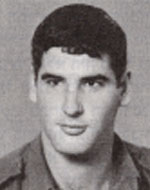Yirmiyahu (Yari), son of Yocheved and Meir, was born in Haifa on September 5, 1948. He completed his elementary studies at the Haya Ziv School in Haifa and later completed “Sammat” high school in Haifa. Yari, as his family and friends called him, was a playful and energetic boy. He provided full employment for everyone around him, but he made his parents happy. From an early age, he joined the Mahanot Haolim youth movement, and in the course of time, his appreciation and loyalty to the values of the movement, to his friends in the group, and to everything related to it grew. When he was a high school student, his love and devotion to his movement collided with his school commitments, and he had to find a way to combine these two occupations. He preferred activity in the movement and wanted to spend most of the day there. But even though his devotion to movement and friends left no time for studies, he managed to fulfill his obligation to study. He was stubborn and adamant. At the same time, his heart was a child’s heart, loved life, laughing and cheerful. In the area of social activity, he contributed greatly to the social life of his group. He spent much of his spare time traveling and organizing trips. He liked to travel, especially looking for remote places, which are not visited often, and always managed to reach such places on the trip. In his love for Israel and its landscapes, he arrived everywhere and visited most parts of the country. He joined the IDF at the end of September 1966. He planned to stay with his teammates for the duration of his service in the army , But despite his attempts to remain with his comrades in the nucleus, he was chosen to take a commanding course for infantry commanders. He completed the course as an outstanding apprentice, and was sent immediately to an officer training course. This course was also successfully completed, and it was found worthy to remain at the base and to instruct additional officers’ courses. However, he objected to this, and after long struggles, his commanders were obliged to do what he wanted and to transfer him to a combat unit. He continued his service in the Golani Brigade, and during the course of time he underwent a parachute training course and became a company commander during the Six-Day War, and spent most of his service in the Golan Heights. In his opinion, the situation of the state and of the army obliged young people like him to remain in service in the permanent army, and he did so for a year and a half, and throughout his service many friends who appreciated his self-confidence acquired his sense of humor and He responded with great seriousness to his role, and fulfilled every task assigned to him And meticulous attention to detail, and is considered an excellent company commander in his unit. In all his commanding duties, he took care of his soldiers first. As a guide in the officer’s course, he took care of the apprenticeship and the needs of his class; As a platoon commander and company commander, the best interests of the soldiers stood at the top of his concerns and he did what he could for them. Shooting was the driving force in every activity – in training, in meetings and parties. He knew how to entice people in conversation, to excite them and to lead them as commander and guide. As a commander, he demanded full obedience, and he was tough and authoritarian – but at the same time, there was always a soul that knew how to provide warmth and help when necessary. After being released from regular service, he was assigned to a reserve unit, and from time to time he was called for periods of active reserve duty. When he returned to civilian life, he decided to devote his time to studying and chose to study industrial and management engineering at the Technion in Haifa. He saw this as a goal to realize his ambitions: managing a factory and especially working with people. In order to finance his studies and cover his expenses independently of his fellow soldiers, he also worked during his studies and vacations. During the Yom Kippur War he participated in the battles against the Syrians in the Golan Heights. During the first battle of the Hermon on October 8, 1973, Yari was hit and killed. He was laid to rest in the military cemetery in Afula. Survived by his parents, brother and sister.
